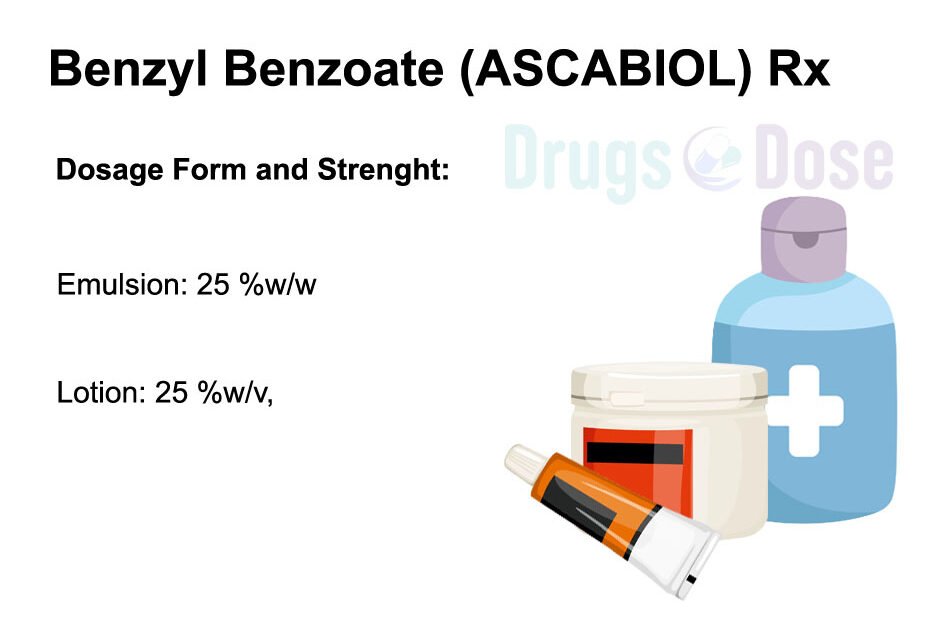Classes
Benzyl Benzoate is used in treatment of scabies and as antipruritic.
DAE Class; Rx
Common Brand Names; ASCABIOL
- Scabicides & pediculocides
Description
Benzyl Benzoate is effective in treatment of scabies and as antipruritic. It has been generally supplanted by lindane.
Benzyl Benzoate Uses
Benzyl Benzoate is primarily used in conditions like Pediculosis pubis and capitis, Scabies.
To use this medicine for lice:
- If your hair has any cream, lotion, ointment, or oil-based product on it, shampoo, rinse, and dry your hair and scalp well before applying benzyl benzoate.
- Apply enough medicine to thoroughly wet the dry hair and scalp or skin.
- Allow the medicine to remain on the affected areas for 24 hours.
- Then, thoroughly wash the affected areas with warm water and soap or regular shampoo.
- Rinse thoroughly and dry with a clean towel.
- After rinsing and drying, use a fine-toothed comb (less than 0.3 mm between the teeth) to remove any remaining nits (eggs) or nit shells from your hair, or, if you have fine hair, you may use a tweezer or your fingernails to pick nits out.
To use this medicine for scabies:
- If your skin has any cream, lotion, ointment, or oil on it, wash, rinse, and dry your skin well before applying benzyl benzoate.
- If you take a bath or shower before using benzyl benzoate, dry the skin well before applying the medicine.
- Apply enough medicine to cover the entire skin surface from the neck down, including the soles of your feet, and rub in well.
- Allow the medicine to remain on the body for 24 hours.
- Then, thoroughly wash the body with warm water and soap.
- Rinse thoroughly and dry with a clean towel.
Contraindications
Benzyl Benzoate is contraindicated in conditions like Broken skin.
Benzyl Benzoate Side Effects
The signs and symptoms that are produced after the acute overdosage of Benzyl Benzoate include Convulsions.
The symptomatic adverse reactions produced by this medicine are more or less tolerable and if they become severe, they can be treated symptomatically, these include Skin irritation, Mucous membrane irritation.
Adverse reactions to benzyl benzoate include skin irritation and hypersensitivity reactions. Oral ingestion may cause harmful stimulation of the CNS and convulsions. It should be avoided by perople with perfume allergy.
Warnings
Benzyl benzoate should not be used on the face, on broken or inflammed skin and in neonates. In elderly the xerosis of the skin make the skin more susceptible to the drying effects of this drug and irritation may be worse in elderly patients. Alternative treatment should be used for the elderly.
Drug should not be given to Geriatrics, and Neonates.
Pregnancy and Lactation
Breast Feeding
There are no adequate studies in women for determining infant risk when using this medication during breastfeeding. Weigh the potential benefits against the potential risks before taking this medication while breastfeeding.
Maximum Dosage
Adults
25 %/As recommended /Topical
Pediatrics
12.5 %/As recommended /Topical
Neonatal
6.5 %/As recommended /Topical
For topical dosage form (emulsion):
For lice infestation:
Adults—Use just one time. For severe cases, treatment may be repeated two or three times after twenty-four hours.
- Children—
- For infants: Use mixed with three parts of water, just one time.
- For older children: Use mixed with an equal quantity of water, just one time.
For scabies infestation:
- Adults—Use just one time. For severe cases, treatment may be repeated after twenty-four hours one time anytime within five days.
- Children—
- For infants: Use mixed with three parts of water, just one time.
- For older children: Use mixed with an equal quantity of water, just one time.
How supplied
Benzyl Benzoate
Emulsion: 25 %w/w,
Lotion: 25 %w/v,
